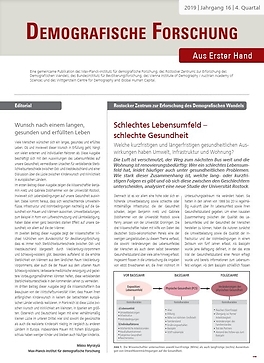December 17, 2019 | Defo News
Poor living environment – poor physical health

© MPIDR
The new issue (No. 4/2019) of Demografische Forschung Aus Erster Hand, the popular science newsletter with latest research results from demography, has been released.
The Newsletter is available in German only.
"Demografische Forschung Aus Erster Hand" is a joint publication of the Max Planck Institute for demographic Research (MPIDR), the Rostocker Zentrum zur Erforschung des Demografischen Wandels (RZ), the Vienna Institute of Demography (VID), the Wittgenstein Centre for Demography and Global Human Capital and the Federal Institute for Population Research (BiB).
The topics of the new issue are:
(Rostock Center for the Study of Demographic Change)
Poor living environment – poor physical health
What short and long-term effects do the environment, infrastructure, and housing conditions have on health?
The air is polluted, the next bus stop is far away, and the dwelling is in need of renovation. Those who have a poor living environment are more likely to have health problems. A new study from the University of Rostock analyzes how strong this association is, what the long or short-term consequences are, and whether these differ between the sexes.
(Federal Institute for Population Research)
Deaths that can be avoided
Mortality in east and west has largely converged – with one exception
Those who smoke, are overweight, or live in areas not well served medically often die earlier than under optimal conditions. Demographers call this “avoidable mortality”. A new study shows that avoidable mortality has nearly converged in the east and west of northern Germany – but this only applies to cities.
(Vienna Institute of Demography)
The large gap
Many women remain involuntarily childless, especially in Germany and Austria
If women across Europe were to have as many children as they wish to have at a young age, the so-called replacement level of 2.1 children per woman would be reached almost everywhere. In practice, however, desire and reality are sometimes very far apart, as a new study from Vienna shows. The differences between the 20 countries looked at are substantial.
The newsletter is released four times a year and is available electronically and as a printed version and is free of charge.
All past issues are available online on the Newsletter website. On the website you also have the possibility to subscribe to the Newsletter to get informed about the release of the new issues or to receive the printed versions by mail.